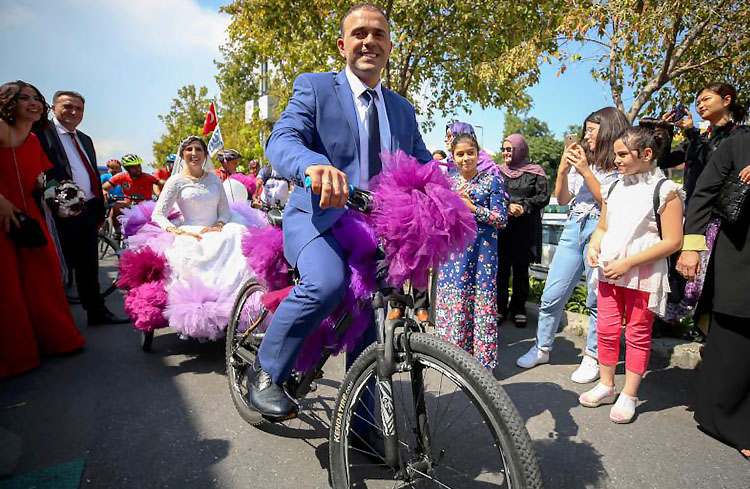Every culture places a high value on marriage, and wedding traditions vary widely from country to country. Since Turkey is a melting pot of different cultures, religions, and histories, it is unsurprising that its wedding traditions have evolved into something exclusive to Turkey.
However, one crucial aspect of Turkish weddings is that they are incredibly inclusive. If you come across a Turkish wedding, feel free to greet the happy couple—you could even get a wedding invitation! Thousands of people frequently attend weddings when entire villages gather, and the mood is “the more, the merrier”, in contrast to the more private weddings that are more typical in other countries.
Follow along to learn more about Turkish weddings before you can attend one yourself or use it as inspiration for your dream destination wedding!
We offer turkey visa online to Turkey for your desired tour, from romantic honeymoons to scenic self-drive road trips to significant destinations.
No “Hen Party”, but a “Henne Night!”
In truth, henna night (also known as kna gecesi in Turkish) serves the same function as a “hen night,” which is to bid adieu to singledom and welcome marriage.
Naturally, despite their similarity, the word has nothing to do with hen parties and instead comes from the custom of burning henna, which is thought to keep married couples safe from harm and strengthen their love for one another. Henna will be intricately painted on everyone attending the wedding, including the bride. The bride and her friends are the main celebrants during the event, while the groom and his friends may make an appearance (clear customs differ).
The fact that the Henna night is both a joyful and sorrowful occasion, with the bride frequently crying as she accepts that she is leaving one way of life and entering another, is another unique aspect of the event.
Playing the pipe and drums.
Turkish drums called davuls and pipes called zurna are traditional wedding music, especially during the run-up. Even though the main wedding music tends to be more modern, similar traditions are still formed today.
As the bride is taken away, there is a celebration.
Typically, the bride’s relatives and friends “give her away” before the groom arrives to take her away. He usually comes in a car decorated with flowers and sashes. As a prank, the bride’s family “refuses to open the door to him,” so the groom frequently needs to knock again. According to some customs, the groom must “bribe” the kids by holding the door closed with change or treats.
Car convoy
This custom originated when horses were the preferred mode of transportation. The bridal car is now followed by a convoy of vehicles that go straight through the village, town, or city. Frequently, the vehicle will stop and play “davul” and “zurna.” As part of the convoy, people often beep their horns. Children will crowd the streets as the car stops and beg the bride and groom for pocket money; the bride and groom usually carry modest amounts of cash in packets ready to give to the kids.
Local dances and halay
The most popular folk dance for weddings is the halay, traditionally performed with the zurna and the davul. People dance in unison while holding hands or dancing together while the same tune cycles through slowly at first and then quickly.
Although the halay dances have varying regional customs, it’s rare to see a Turkish wedding without it being played and danced to!
The actual wedding ceremony
The ceremony itself couldn’t be easier. A municipality or local authority official (nikah memuru) will legally pronounce you married after the bride and groom each chooses a witness. This employee is a local government official who acknowledges your marriage; they are neither religious leaders nor lawyers. From beginning to end, the process takes about 15 minutes. The marriage certificate is presented to the happy couple after witnesses, the bride, and the groom have signed it, and the ceremony is done. Now it’s time to party!
Pinning gifts on the bride and groom
In Türkiye, the traditional wedding presents are gold and cash, and there is often even a ceremony after the legal union is complete. The couple is wearing sashes as guests approach one at a time to snap pictures with the bride and groom and pin gold or cash onto the sashes. The funds will then assist the couple in starting their new lives together by purchasing a home or other needs.
Food and celebration
Following a wedding, there is often a large feast for all the guests, dancing, and celebration—usually lasting well into the night! The “top of the pop” music that plays everywhere is just as likely to be heard at a Turkish wedding celebration as everywhere else, even though the music is more likely to be Turkish. In general, this is probably like the rest of the world.
Apply for a turkey visa online, pack your bags and book a flight is all necessary to begin a fantastic vacation.
